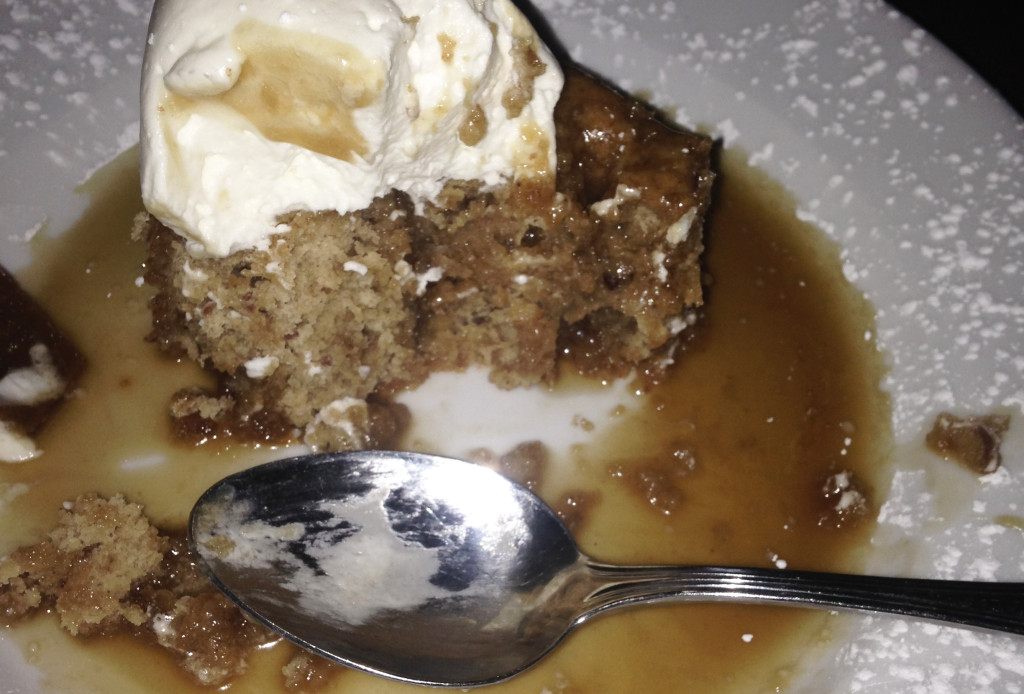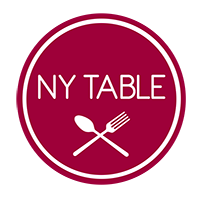Putting British Food on the Map in America
By Kiley Bense
It’s a British invasion, part two. In the last few years, Americans have clamored to buy tabloids featuring Kate Middleton’s latest fascinators, rehashed reruns of the television series “Downton Abbey” and “Sherlock,” and cheered on the Spice Girls at the London Olympics. “It has put Britain on the map,” says Scott Robertson, who owns two British pubs in Manhattan, of all the recent attention. Adds his wife, Sinead Naughton: “Everything English is cool and trendy right now.”

Sticky toffee pudding at the Cock & Bull pub in Midtown. Photo: Kiley Bense.
Robertson and Naughton moved to New York in the 1990s, Robertson from England, Naughton from Ireland, when they were in their twenties. They met in an Irish pub at a time when there were few British-themed bars in the city. “I think that Irish pub grub filled the void, as it was the closest thing for most Brits,” says Naughton.
Traditional British cuisine, known for all things heavy, fried and bland, was once an easy punch line. But the neglected stepchild of continental cooking seems to be benefiting from the recent Anglo-hype. Robertson says that five other British pubs have opened in New York since he opened his first in 2011. Alcoholic cider, long enormously popular in Britain as an alternative to beer, is becoming trendy.
The royal wedding alone generated a huge uptick in sales, according to Jennifer Myers-Pulidore, who runs Myers of Keswick, a British grocery store in the Village that’s been open since 1985. “Come five o’clock, the lines were just out the door,” she says of the day of the wedding. “Who doesn’t love a royal story?” Myers-Pulidore’s father, an expat, founded the store when a vacation to New York turned into a permanent stay, and she took over daily operations in 2007. When he’s not visiting England, Peter Myers can still be found at the store most of the time.
More than 650,000 British expats live in the U.S., 60,500 of them in New York state. While they (and the British tourists who wander by on their way to the High Line) make up the majority of Myers’ customers, this isn’t always the case for Robertson’s pubs. At 5 p.m. on a Friday, The Churchill, in Murray Hill, is full of young American business associates wearing suits and drinking imported beers. Naughton thinks that Americans might be charmed by the culture of “taverns and craft beer” that the Brits do so well. Others have visited England or worked there and view the Churchill as a chance to relive the pub scene there.
Some of their American customers drink cider, which the Churchill has on tap. Although the ciders at the Churchill are English, Robertson has tried some of the new American ciders and thinks they are getting “very good.”
Gidon Coll, an American who founded Original Sin cider in 1997, was inspired to start his company on a trip to London, but in the early years of his business, many New York bars refused to stock Coll’s cider. That’s not true now, in the era of artisan cidery openings, gluten-free grocery aisles, and hard cider TV commercials. (Sam Adams’ parent company, Boston Beer Company, one of the largest American-owned breweries, is behind the ads for Angry Orchards cider.) “Cider has become big business,” Coll says, citing 63 percent growth in cider in the U.S. in the last year.
Strongbow, a cider that rules 29 percent of the market in the U.K., has been more widely distributed in the United States since 2012, when Heineken took over the process from a smaller company. British pubs in the U.S. tend to stock Strongbow alongside Magner’s, which is Irish, and other U.K. ciders, like Blackthorn. Most British ciders are drier and lighter than American ciders, especially the mass market ones. Coll says that some companies assume that Americans are looking for a sweeter drink, so they increase the sugar in the cider. But he thinks that the future of the cider market in the U.S. depends on the availability of dry, complex ciders more similar to British brands.
Unlike upscale gastropubs inspired by the Spotted Pig in the West Village and the Fat Duck in England, the Churchill aspires to be a homey, neighborhood meeting place. When Scott Robertson and his wife were scouting locations, the space’s low ceilings, a turn-off for other potential buyers, seemed perfect to them, echoing the squat old buildings that house many country pubs in England. “We thought, ‘It’s a cozy pub. That’s brilliant,’” Scott says.
The ceilings are now laid with wooden beams, the bar covered in copper. The Churchill serves classic English pub food: Scotch eggs sliced in half and accompanied by a dish of Branston pickle, fish and chips, devils on horseback (dates stuffed with Stilton cheese and wrapped in bacon). Its Sunday roast may inspire devotion, but the tavern is perhaps most famous for the recording of Winston Churchill that plays in the bathroom.
At Myers of Keswick, the staff makes Scotch eggs daily, a British tradition since the 18th century. They fill a silver-colored basin of chunks of raw pork, add salt, white pepper, parsley and water, dump the contents into the funnel of a meat grinder and turn the handle until the pork emerges from the end in a bouquet of round, pink strings.
After the meat is ground and mixed again, they hold one shiny hardboiled egg to the spigot at a time, turning the lever on the other side while moving the egg in small circles so that meat spools neatly around it like yarn. Then, they douse the egg in breadcrumbs and bake.
The tiny kitchen at Myers of Keswick turns out 60 Scotch eggs every day. They also make pork pies and pasties, rolling out the pastry on a granite countertop spotted with faint rings of flour. Myers is a homesick expat’s dream: shelves stocked with tubes of Digestives and Hobnobs, two types of cookies; stately boxes of Twinings Earl Grey; cans of mushy peas. They even carry English cleaning products, like Fairy dish soap. A faded portrait of the young Queen Elizabeth II hangs on the wall.
Myers of Keswick has staked its reputation on bangers, the sausages that form an essential part of any full English breakfast, which it supplies to many of New York’s British and Irish pubs. Jennifer Myers-Pulidore comes from a family of three generations of butchers. Her father came to New York in 1972, and her grandfather followed after Jennifer was born. He began making the sausage rolls and pasties he’d grown up cooking, word of them spread, and soon friends were bringing other expats along with them to recapture a taste of home in New York. The demand was great enough that her father decided to open the market. “Every year, it got busier and busier,” Myers-Pulidore says.
However, there may be limits to Americans’ newfound interest across-the-pond style dining. When asked what foods Americans aren’t ready for, Myers-Pulidore has a ready answer. “I don’t think Americans are as quick to order a full English breakfast,” she says, referring to the traditional plate of fried bread, fried eggs, fried tomatoes, blood sausage, baked beans, and back bacon.
Tags: British, Manhattan, Midtown
Your Comments